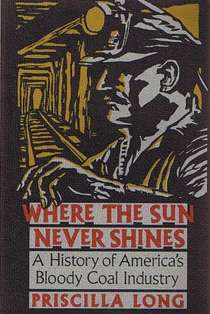

 |

|

The average rating for Where the Sun Never Shines : A History of America's Bloody Coal Industry - Priscilla Long - ... based on 2 reviews is 3.5 stars.
Review # 1 was written on 2009-02-11 00:00:00 Jasmin Martinez Jasmin MartinezWhere the Sun Never Shines brings to life the long struggle of coal miners to attain reasonable working conditions. Long has a very readable style which will hold your attention throughout. Conditions in the mines were truly horrible. It was not uncommon for small children and women to work as the miners were paid by their output. The system was such that mine owners never suffered from a miner's inefficiency or illness; they simply added more miners. The miners had to supply their own tools, had to shore up the ceilings, clean out clay and rock, and move the coal to the surface. This was called "deadwork," and the miners received no pay for it. One of the earliest demands from miners was to be paid for this deadwork. American mines were notoriously unsafe. Mine owners had no incentive to increase safety as times were hard and they had no trouble obtaining additional workers. The work was brutal. It was not unusual for the miner to have to carry sacks of coal weighing from 150 to 200 lbs to the surface where the coal operators controlled the rates of pay, cheated on the scales and forced the miners to buy "nut" coal (coal too small to be paid for) that they needed to heat their homes. Miners were paid not in legal tender but company money which they could only use at the company stores where prices were kept artificially high. It was common for a miner to need credit to buy essentials, like blasting powder and food. Then at the end of the month he would discover he actually owed more than he had earned. Railroads frequently owned mines. Ownership gave them numerous advantages. They needed coal for their engines. They also transported the coal and thus could control the distribution of coal cars (very useful during strikes.) The more they transported the more money they made and they ruthlessly forced smaller coal' company operators out of business by denying. them the coal cars needed to get the product to market. They also controlled availability of cars to miners who until the early 1930's were paid by the ton delivered, so the company controlled loyalty by making more cars available to favored employees. Typically a miner might spend 25-40% of his time waiting for coal cars. As miners became more organized the companies utilized enormous financial and political resources to become viciously repressive. The Ludlow massacre of April 1914 finally began to turn public sentiment in favor of the miners' plight. At Ludlow, the Colorado National Guard fired on a strikers' tent camp killing many women and children. The Guard was being paid by the company and showed not a hint of neutrality. President Wilson was busy invading Mexico and the miners had not even received the support of the national union which had its own political agenda. Finally, public pressure forced Wilson to send in the D.S Army and a settlement (mostly favoring the companies) was imposed by the national government. Even though they won the strike, the companies had suffered a public relations debacle. Business visionaries realized it was time to control that aspect of business. They had reorganized business into great conglomerates, controlled finance, and it was time to regulate consent (i.e. public reactions.) Rockefeller Jr., head of Standard Oil, hired Ivy Lee, a brilliant publicist. Lee created the idea of the company union; that is, create the appearance of worker unity by establishment of a grievance board for workers and to outwardly improve working conditions. (Lee eventually fell into disgrace when it was learned in 1934 that at the behest of Standard Oil he was working at polishing the image of Adolf Hitler and the German Nazi party for Standard Oil's German affiliate, I.G. Farben.) As Gabriel Kolko has pointed out in Triumph of Conservatism(read this for class in college - terrific book--), this was a time when business realized it needed a stable social environment in which to conduct profitable business and it encouraged government regulations which helped to guarantee maximum profit at the least amount of risk. Corporations moved to control adverse public opinion by buying up magazines and controlling editorial boards or by withdrawing advertising from publications that printed articles by the muckrakers. The final blow to mineworkers was the rise of oil as an alternative energy source. |
Review # 2 was written on 2009-09-15 00:00:00 Robert Taylor Robert TaylorMuch of interest! |
CAN'T FIND WHAT YOU'RE LOOKING FOR? CLICK HERE!!!